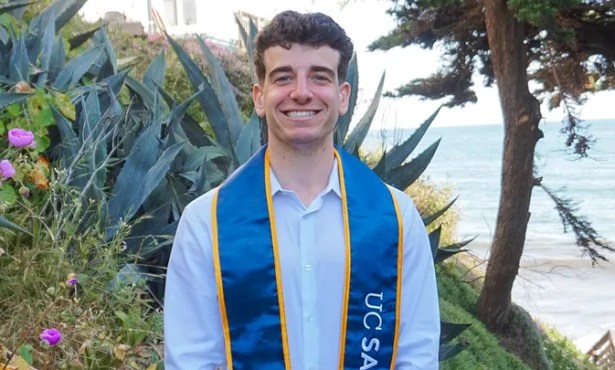Aaron Belkin Explains Don’t Ask, Don’t Tell
Director of Think Tank on the Military and Sexual Minorities Discusses Gays in the Service
The Independent‘s Gay Girl columnist recently spoke with Professor Aaron Belkin, director of UCSB’s Palm Center, a think tank devoted to researching sexual minorities and the military. Belkin is featured in Ask Not, a documentary about the military’s Don’t Ask, Don’t Tell policy, which premieres on PBS on June 16. For a preview of the film, go here. The full interview follows.

Why is it important to repeal Don’t Ask, Don’t Tell?
The research shows the policy is hurting the military. Discrimination is bad for national security. That makes sense when you fire Arabic linguists for being gay in the middle of a dire shortage.
The research also shows that integration is good for militaries. Integration would solve a number of problems the military now has – saving money, brain drain. But there’s also a question of citizenship, and what it means for the idea of American citizenship when the biggest employer in the country goes out of its way to fire people just because of who they are. Whether you’re talking about national security or citizenship, there are a number of reasons why this is an important policy.
Should it be overturned by executive order or legislatively?
I should be clear about that. [The Palm Center] actually didn’t say that the Don’t Ask, Don’t Tell law could be overturned. There’s a little distinction, but it’s actually important legally. We said that the president has the authority to suspend the law, in other words to suspend the discharge process.
It would be much more ideal if Congress and the president worked together to get rid of the law, because you just don’t want a federal law on the books that institutionalizes discrimination the way that the Don’t Ask, Don’t Tell law does. However, it looks like the president doesn’t want to spend the political capital necessary to get rid of the law and in the interim, we’ve argued, he could solve half the problem by executive order, by the stroke of the pen, in other words. He could suspend the gay discharge process and eliminate some of the worst parts of Don’t Ask, Don’t Tell and then later on, when people see gays serving legally, he could come back and work with Congress and repeal the law.
It’s an interim step. A lot of civil rights struggles take a long time – think of the three generations it took to get from Plessy v. Ferguson to the voting rights act. It would be quite a big step if he would use his executive authority to suspend the law.
How close are we to getting Don’t Ask, Don’t Tell repealed?
I don’t think we’re close. Spokesperson [Robert] Gibbs has said quite clearly a number of times that the president will not sign an executive order. Every indication is that the White House doesn’t want to touch this issue, probably for quite a long time.
I think there’s a case to be made that maybe they’ll get around to it before the end of the first administration. But there’s a chance – a good chance – that they might not touch this for the first four years. In fact, that’s where I would bet my money. There have been a number of reasons why I think delay is the most likely course.
And that’s why the Palm Center advocates the executive order to suspend it, so we can make at least some headway.
You know he doesn’t want to spend the political capital to get rid of the law. There’s just no reason to keep firing Arabic linguists for being gay. Obama said quite clearly on the campaign trail that discrimination is wrong and hurts the military and that the time to deal with it is now. The reason the White House has provided so far for not wanting to sign an executive order in the interim while they wait for a congressional process is that an executive order would not be durable. That’s just wrong. That’s just factually incorrect. So I don’t know why the White House won’t sign an order, but I wouldn’t expect an order or the legislative process any time soon.
There was so much hopefulness in the gay community with the election of Obama. Has he come through?
On the one hand, it’s been less than half a year and he’s got a lot of crises to deal with. On the other hand, there’s some very easy things he could do, and he’s clearly shown himself as able to multitask. The very first thing he does when he takes office is put Rick Warren in front of the country to give the benediction.
The tiny little steps that we’ve seen from the White House on gay issues in the first few months have been anemic. There are basically no openly gay people appointed to senior policy positions – there are some who’ve been appointed to what I would call somewhat senior positions – but in the way of serious policy advisers in the president’s circle, there’s no one. So I would say, yeah, the administration has fallen quite far below the bar where candidate Obama said he would be by now.
So you think there’s a pretty big divide between candidate Obama and President Obama?
I think that issue after issue after issue, when it comes to gay rights, there is quite a divide between candidate Obama and President Obama.
It’s good for the overall gay community when people come out. But is it good for the cause of repealing Don’t Ask, Don’t Tell when people like Lt. Dan Choi and Sgt. Darren Manzella, who have both been discharged after publicly revealing their sexuality, come out as gay?
I would never encourage anyone to break the law, although coming out of the closet in the military isn’t breaking the law, it’s just announcing that you’re willing to be discharged. On the one hand, we have polling data that shows that many people in the military already know a gay person in their unit and the majority of those people don’t have any problem with it. On the one hand, Dan Choi and Darren Manzella are doing what tens of thousands of gays and lesbians are already doing, and straight people are more than professional enough to handle that.
On the other hand, it does personify the issue in quite a striking way when an Arabic linguist with Iraq combat experience like Dan Choi says, “I want to serve. I don’t want to be fired, but I shouldn’t have to live a lie, and it hurts the mission when the government makes me live a lie.”
It gives us people to rally around as opposed to just an issue or a subject.
People don’t rally around a study or a slogan. They rally around stories of other people. Dan Choi has moved the issue forward light years because he personifies the hypocrisy at the heart of the law; he personifies the lunacy of firing Arabic linguists who want to serve, but who shouldn’t have to serve and live a lie.
Is Don’t Ask, Don’t Tell a military issue or a political issue?
This is completely a political issue and it’s been a political issue for 15 years, and certainly for the last 15 years since President Clinton tried to get the Pentagon to overturn this ban.
To the extent that this policy has anything to do with unit cohesion, it undermines unit cohesion. So the people who support this policy feel so strongly about their desire to discriminate that they would rather have discrimination even if it hurts military effectiveness and then they lie by claiming that discrimination is necessary for military effectiveness.
This policy has nothing to do with preserving military effectiveness or unit cohesion, and it never has and it never will. We knew, back in 1993, that discrimination was bad for the military and that integration helped the military. The Department of Defense itself commissioned a $2 million study from the RAND Corporation, a quasi-official military think tank, and that study found that there would be no problem with unit cohesion. The generals don’t care about the research because it’s not about the research or the data or the facts or military readiness for them.
Women are integrated into the military, yet we hear about harassment or assault of them in the service, which would seem to indicate a lack of unit cohesion. So that argument of “unit cohesion” doesn’t really hold water for me, since women are allowed to serve and they seem to upset that cohesion.
I totally get that people who support discrimination can construct an English sentence that says, “Equality undermines unit cohesion.” I think they can say that, it can be grammatically correct. But the question is if there’s any evidence to support that.
With regard to African-Americans in the military and women in the military and gays and lesbians in the military, opponents of equality have made exactly the same arguments. In fact, there are studies that show that even though racism and homophobia and sexism are very different issues, the arguments, when it comes to military discrimination, always look the same. So the question really is what does the data show.
People in the military will keep repeating the sentence that “integration will undermine unit cohesion” as long as they are allowed to repeat that. But once the civilians come in and force them to obey a more enlightened and helpful standard, then that rhetoric will go away. It’s a really, really complicated issue because it’s hard to tell what’s a legitimate concern about unit cohesion, what’s a fake argument, what’s the text, what’s the subtext. It’s intentionally confusing. There are a lot of stories about that.
What can everyday individuals do to fight against this policy?
I would say get educated, and read up on the policy. We have a bunch of studies posted on the Web, all of which are written in very accessible language – none of it is designed to be inaccessible or jargon-y. Talk to family members in the military, or friends who are in the military, or friends or family members who know people in the military. Listen to them and see what they think and then talk to them about the data that you know about and share the evidence. And third, hold your politicians accountable. Ask them whether they are a cosponsor of the Military Readiness Enhancement Act, and if not, why not. I’d say those would be three good steps.
Is there anything else you’d like to add?
We’ve been talking in this whole conversation about the difference between the civil rights arguments and the military effectiveness and unit cohesion arguments, but one thing that I think is not often clear is that – just focusing on the civil rights side – this is not even primarily about the soldiers’ civil rights.
This is not just about gay and lesbian soldiers who deserve their rights, although of course gay and lesbian soldiers do deserve their rights, and it’s not even really about whether gay and lesbian people deserve their rights, although of course we do. This is really a broader issue of citizenship. It is a very profound detriment to citizenship for all Americans – gay, straight, whatever – when the government fires people, when it allocates rewards and punishments, on the basis of who you are.
In this country, you’re only supposed to be punished for things you do, not for who you are. Don’t Ask, Don’t Tell actually goes out of its way to pretend to be a law that punishes what you do, but that’s absolutely not true. Don’t Ask, Don’t Tell punishes people simply for being, simply for having an identity.
There’s a Harvard Law professor, Janet Halley, who argues that the legal standard at the heart of Don’t Ask, Don’t Tell is so dangerous that if that standard were amplified to other laws and institutions, we would have a very compromised situation. That really is the first step on the road to fascism: punishing people simply for who they are. And that’s why everyone should be really upset about this law, this policy.



